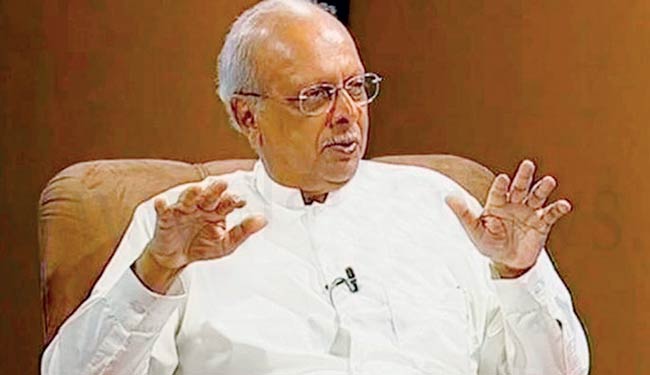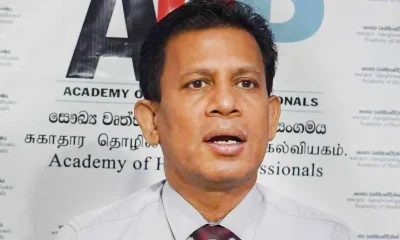News
LSSP marks 89 years, calls for revival of welfare state and economic justice

The Lanka Sama Samaja Party (LSSP) celebrated its 89th anniversary this weekend, reaffirming its commitment to addressing poverty, promoting social justice, and reviving the welfare state in Sri Lanka.In a message marking the occasion, party leader Prof. Tissa Vitarana highlighted the global decline of capitalism and its devastating impact on both developed and developing nations, including Sri Lanka.
Prof. Vitarana said that the capitalist socio-economic system is in its final phase of decline, citing global examples such as Volkswagen’s closure of major plants in Germany, job losses, and wage cuts. “This decline is exacerbating economic disparities worldwide, with poorer nations bearing the brunt of exploitation,” he said.
In Sri Lanka, 63% of families live below the poverty line, unable to meet basic needs such as food and medicine. Malnutrition among children, which stood at 14.3% two years ago, has now risen to 30.7%, Prof. Vitarana noted. He warned of dire consequences for the next generation, including stunted physical and mental development, unless urgent measures are taken to provide essential nutrients at affordable prices.
The LSSP leader called on the government to reintroduce targeted welfare programs, including free or subsidized food distribution through cooperatives, as implemented by former LSSP leader Dr. N. M. Perera during the 1972/73 economic crisis. He also urged the removal of indirect taxes burdening the poor and their redistribution to wealthier segments of society.
Prof. Vitarana criticized the government’s adherence to International Monetary Fund (IMF) policies, arguing that they increase foreign debt and undermine essential public services. He cited the erosion of Prof. Senaka Bibile’s National Medicinal Drug Policy as a key factor behind medicine shortages and rising healthcare costs, which disproportionately affect the poor.
On international issues, Prof. Vitarana condemned what he described as the “barbaric actions” of Israel in Gaza, accusing the United States of enabling such actions to maintain its global dominance. He argued that the U.S. economy, heavily reliant on the arms industry, promotes conflicts worldwide to sustain demand.
Prof. Vitarana also highlighted the emergence of BRICS (Brazil, Russia, India, China, and South Africa) as an alternative to Western-led economic systems. He advocated for Sri Lanka to join the BRICS alliance, which he sees as a pathway to economic sovereignty and reduced dependence on Western powers.
Turning to domestic industrial policy, Prof. Vitarana called for greater utilization of existing resources, such as the SLINTEC nanotechnology center and the Vidatha Centres, which have supported over 12,000 small and medium enterprises. He stressed the need for innovation and digital technology to drive industrialization and create a sustainable economic future.
Addressing climate change, he underscored the importance of proactive planning to mitigate its impacts while warning against potential threats from international agreements like the Millennium Challenge Corporation (MCC) and the Status of Forces Agreement (SOFA), which he claims undermine national sovereignty.
Prof. Vitarana concluded by reaffirming the LSSP’s commitment to fighting for the rights of the poor and marginalized, emphasizing the party’s historical role in championing social justice and its vision for a welfare-oriented future.
Latest News
Interment of singer Latha Walpola at Borella on Wednesday [31st]

Family sources have confirmed that the interment of singer Latha Walpola will be performed at the General Cemetery Borella on Wednesday (31 December).
News
Western Naval Command conducts beach cleanup to mark Navy’s 75th anniversary

In an environmental initiative commemorating the 75th anniversary of the Sri Lanka Navy, the Western Naval Command organized a cleanup programme at Galle Face Beach on Saturday (27 Dec 25).
The programme focused on the removal of substantial solid waste littering the beachfront, including accumulated plastic and polythene debris. All collected wastey was systematically disposed of utilizing methods designed to safeguard the sensitive coastal ecosystem.
Demonstrating a strong commitment to the cause, the cleanup effort saw the participation of the Commander Western Naval Area and a group of over 200 naval personnel.
News
Environmentalists warn Sri Lanka’s ecological safeguards are failing

Sri Lanka’s environmental protection framework is rapidly eroding, with weak law enforcement, politically driven development and the routine sidelining of environmental safeguards pushing the country towards an ecological crisis, leading environmentalists have warned.
Dilena Pathragoda, Managing Director of the Centre for Environmental Justice (CEJ), has said the growing environmental damage across the island is not the result of regulatory gaps, but of persistent failure to enforce existing laws.
“Sri Lanka does not suffer from a lack of environmental regulations — it suffers from a lack of political will to enforce them,” Pathragoda told The Sunday Island. “Environmental destruction is taking place openly, often with official knowledge, and almost always without accountability.”
Dr. Pathragoda has said environmental impact assessments are increasingly treated as procedural formalities rather than binding safeguards, allowing ecologically sensitive areas to be cleared or altered with minimal oversight.
“When environmental approvals are rushed, diluted or ignored altogether, the consequences are predictable — habitat loss, biodiversity decline and escalating conflict between humans and nature,” Pathragoda said.
Environmental activist Janaka Withanage warned that unregulated development and land-use changes are dismantling natural ecosystems that have sustained rural communities for generations.
“We are destroying natural buffers that protect people from floods, droughts and soil erosion,” Withanage said. “Once wetlands, forests and river catchments are damaged, the impacts are felt far beyond the project site.”
Withanage said communities are increasingly left vulnerable as environmental degradation accelerates, while those responsible rarely face legal consequences.
“What we see is selective enforcement,” he said. “Small-scale offenders are targeted, while large-scale violations linked to powerful interests continue unchecked.”
Both environmentalists warned that climate variability is amplifying the damage caused by poor planning, placing additional strain on ecosystems already weakened by deforestation, sand mining and infrastructure expansion.
Pathragoda stressed that environmental protection must be treated as a national priority rather than a development obstacle.
“Environmental laws exist to protect people, livelihoods and the economy,” he said. “Ignoring them will only increase disaster risk and long-term economic losses.”
Withanage echoed the call for urgent reform, warning that continued neglect would result in irreversible damage.
“If this trajectory continues, future generations will inherit an island far more vulnerable and far less resilient,” he said.
Environmental groups say Sri Lanka’s standing as a biodiversity hotspot — and its resilience to climate-driven disasters — will ultimately depend on whether environmental governance is restored before critical thresholds are crossed.
By Ifham Nizam ✍️
-

 News6 days ago
News6 days agoMembers of Lankan Community in Washington D.C. donates to ‘Rebuilding Sri Lanka’ Flood Relief Fund
-

 News4 days ago
News4 days agoBritish MP calls on Foreign Secretary to expand sanction package against ‘Sri Lankan war criminals’
-

 News7 days ago
News7 days agoAir quality deteriorating in Sri Lanka
-

 News7 days ago
News7 days agoCardinal urges govt. not to weaken key socio-cultural institutions
-

 Features6 days ago
Features6 days agoGeneral education reforms: What about language and ethnicity?
-

 Opinion7 days ago
Opinion7 days agoRanwala crash: Govt. lays bare its true face
-

 News6 days ago
News6 days agoSuspension of Indian drug part of cover-up by NMRA: Academy of Health Professionals
-

 News7 days ago
News7 days agoCID probes unauthorised access to PNB’s vessel monitoring system













